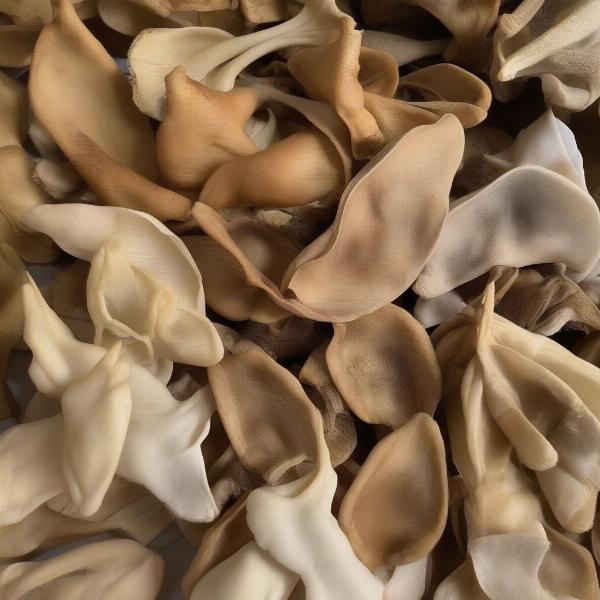Cow ears are a popular chew treat for dogs, offering a long-lasting source of entertainment and satisfaction. But are they a healthy and safe option for your furry friend? This comprehensive guide dives into the pros and cons of cow ears for dogs, exploring their nutritional value, potential risks, and best practices for offering them safely.
Understanding the Appeal of Cow Ears
Dogs are natural chewers, and providing them with appropriate chew toys and treats is essential for their dental health, mental stimulation, and overall well-being. Cow ears satisfy this instinctual need, offering a tough, textured chew that can keep them occupied for extended periods. The chewy nature of cow ears can help scrape away plaque and tartar buildup, promoting cleaner teeth and fresher breath. For dogs with anxiety or excess energy, the act of chewing can be a calming and therapeutic activity.
Nutritional Value and Potential Risks of Cow Ears for Dogs
Cow ears are primarily cartilage, which is a source of chondroitin and glucosamine, compounds known to support joint health. However, cow ears are also relatively high in fat and calories. While a small piece occasionally won’t harm a healthy dog, excessive consumption can contribute to weight gain and digestive issues like diarrhea or pancreatitis.
 Cow ears for dogs various sizes
Cow ears for dogs various sizes
Another concern is the potential for bacterial contamination, particularly with Salmonella or E. coli. While most commercially available cow ears are treated to minimize this risk, it’s crucial to choose products from reputable sources and follow proper storage guidelines. Always supervise your dog when they’re chewing on a cow ear, and discard any leftover pieces to prevent bacterial growth.
Are Cow Ears Good for All Dogs?
While cow ears can be a beneficial treat for many dogs, they aren’t suitable for every canine companion. Puppies with developing teeth might struggle to chew on the tough cartilage, increasing the risk of choking or digestive upset. Similarly, senior dogs with weakened jaws or missing teeth might find cow ears too difficult to manage. If your dog has a history of food allergies, sensitivities, or pancreatitis, consult your veterinarian before introducing cow ears to their diet.
Safe Practices for Giving Your Dog Cow Ears
- Choose high-quality cow ears from reputable brands. Look for products that are free of artificial colors, flavors, and preservatives.
- Always supervise your dog while they are enjoying a cow ear.
- Discard any uneaten portions after a reasonable chewing session.
- Offer cow ears in moderation to prevent excessive calorie intake and potential digestive issues.
- Monitor your dog for any signs of digestive upset, such as vomiting or diarrhea, and consult your veterinarian if these occur.
- Consider offering smaller pieces or split cow ears for smaller dogs or those with weaker jaws.
Conclusion
Cow ears can provide a satisfying and long-lasting chew for dogs, offering benefits for dental health and mental stimulation. However, it’s crucial to choose high-quality products, offer them in moderation, and supervise your dog while they’re chewing. By following these guidelines, you can help ensure that cow ears are a safe and enjoyable treat for your furry friend.
FAQ
- Are cow ears digestible for dogs? While some parts of the cow ear are digestible, a large portion consists of cartilage, which can be difficult for some dogs to break down completely.
- Can puppies have cow ears? It’s generally recommended to avoid giving cow ears to puppies, as their developing teeth might not be strong enough to handle them safely.
- How often can I give my dog a cow ear? Cow ears should be given as an occasional treat, not as a regular part of your dog’s diet. One or two times a week is usually sufficient for most dogs.
- What should I do if my dog swallows a large piece of cow ear? If your dog swallows a large piece of cow ear and shows signs of distress, contact your veterinarian immediately.
- Are there any alternatives to cow ears for dogs? Yes, there are many other chew treats available, such as bully sticks, dental chews, and natural rubber toys.
Related Articles
ILM Dog is a leading international website dedicated to providing expert advice and resources on all aspects of dog care and wellbeing. From breed selection and health advice to training tips and product reviews, we are your one-stop shop for everything dog-related. tripe for dogs raw Our comprehensive articles cover topics such as nutrition, grooming, exercise, and even traveling with your canine companion. For any questions regarding dog health and nutrition, contact us via email at [email protected] or by phone at +44 20-3965-8624. ILM Dog – your trusted partner in responsible dog ownership.